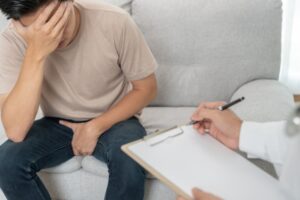Orchialgia/Scrotal Pain in Los Angeles & San Francisco
Relief from Chronic Scrotal Pain

Persistent pain or discomfort in the testicles or genitals can be very troubling. When the pain or discomfort is so intense that it interferes with your daily activities or quality of life, you should seek medical care. Identifying the root cause of testicular pain (clinically referred to as orchialgia) can be challenging and requires the knowledge and experience of a sexual and reproductive health expert like Dr. Paul Turek. Drawing from his many years of clinical experience, he will try to identify the cause of your pain and recommend a suitable plan of action to relieve the discomfort.
Common Causes of Scrotal and Genital Pain

- Trauma or injury
- Testicular torsion, or a twisting of the spermatic cord that restricts blood flow to the testicles
- Infection or inflammation of the epididymis, the tube behind the testicles that stores and carries sperm to the vas deferens. Bacteria and tuberculosis are common infections in the genital tract.
- Sexually transmitted diseases like chlamydia
- An enlarged prostate
- Orchitis, an inflammation of the testicle.
- Varicocele – enlarged veins of the scrotum
- Hydrocele – swelling that occurs when fluid accumulates in the sheath surrounding the testicle
- Spermatocele – painful cysts that develop on the epididymis
- Inguinal hernia, which occurs when part of the intestine protrudes through a weak area of the lower abdominal wall
- Post-vasectomy pain syndrome
- Ejaculatory duct obstruction
- Prostatitis
- Referred pain from the spine or hip
Diagnosing Orchialgia and Other Types of Genital Pain
Dr. Turek begins with a medical evaluation that includes a detailed discussion of your symptoms, a medical history and a physical examination. Depending on the type of pain, he may request you undergo a screening for sexually transmitted infections, a urine test an ultrasound or other imaging.
Finding Relief from Chronic Scrotal Pain

Dr. Turek’s philosophy in treating scrotal pain is to proceed from the least invasive to the most invasive therapies. To this end, often the first line treatment of scrotal pain is noninvasive treatments like anti-inflammatory medications and changes in physical activity.
If medical therapies are ineffective, and to help determine the origin of the pain, Dr. Turek may perform a spermatic cord block. This involves injecting a local anesthetic and steroid into the spermatic cord, or the structure that carries the vas deferens, nerves, blood vessels and lymphatics to the testicle. If the spermatic cord block temporarily eliminates the pain, microsurgical spermatic cord denervation (i.e., interrupting the nerve-containing structures) is an option for long-term pain relief.
Other treatment options for scrotal pain due to anatomical causes include:
- Frenuloplasty to increase the movement of the penile skin and reduce pain during erections
- Circumcision to reduce the risk of inflammatory and infectious diseases that may lead to pain
- Spermatocelectomy to remove a spermatocele and reduce pressure on the testes
- Microscopic spermatic cord neurolysis to surgically interrupt the nerves
- Hydrocelectomy to remove a hydrocele that is causing discomfort
- Epididymectomy to remove part or all of the epididymis
- Orchiectomy to remove one or both testicles
- Excision of a scrotal sebaceous cyst
- Inguinal hernia repair to treat pain due to hernias
Orchialgia (Chronic Testicular Pain) FAQs
Can stress or anxiety cause testicular pain?

Are there any lifestyle changes that help with orchialgia?
In some cases, yes. Avoiding activities that aggravate symptoms (such as prolonged sitting, biking, or heavy lifting) can help reduce pain. Wearing supportive underwear or athletic compression shorts may reduce scrotal movement and ease discomfort. Reducing alcohol, caffeine, and smoking can also benefit pelvic circulation and nerve sensitivity. For men with chronic pain, even subtle changes in posture and movement can sometimes bring relief.
Can exercise worsen testicular pain?
Maybe. It depends on the type of exercise and also the underlying cause of the pain. High-impact workouts, intense cycling, or heavy squats can exacerbate pain, especially if there’s an issue like a varicocele or past trauma. On the flip side, gentle activity like walking, yoga, or swimming can improve blood flow, reduce inflammation, and promote healing. If certain exercises cause pain, Dr. Turek may recommend modifying your routine or pausing temporarily while the issue is evaluated.
Are there home remedies or stretches for scrotal pain relief?
Home care should always be approached with caution, but there are a few safe things to try. Warm baths can help relax the muscles and soothe minor discomfort (but not advised if fertility is a consideration). Supportive underwear, like briefs or jock straps, may reduce tension in the scrotum. Gentle pelvic floor stretches, under the guidance of a trained physical therapist, may relieve pain caused by nerve entrapment or muscle tension. However, persistent or severe pain should always be evaluated by a specialist to rule out serious conditions like torsion or infection.
How do I manage testicular pain after an injury?
First, the injury should be evaluated by a medical professional. If nothing acute is found, such as twisting (torsion) or fracture of the testis that requires surgery, then applying ice packs (wrapped in cloth) during the first 24–48 hours can help reduce swelling and bruising. Rest, elevate the scrotum with a towel, and use over-the-counter anti-inflammatories like ibuprofen (if approved by your doctor) can also help. If the pain continues to be severe, prolonged or is accompanied by, nausea, vomiting or fever, it’s time to check in again with a medical professional.
What are the risks of ignoring testicular pain?
Ignoring acute pain can lead to loss of testis due to twisting, injury or infection. Chronic pain left untreated can lead to nerve sensitization, decreased quality of life, and can make the condition harder to manage down the road. Dr. Turek recommends urgent medical evaluation for any new testicular pain and early medical evaluation for chronic testicular pain.
Is testicular pain common in teenagers or older adults?
Yes, it is common in both but for different reasons. In adolescents, torsion (twisting of the testis), minor trauma and infections are common and require urgent care. In older men, epididymitis, varicocele, groin hernias and prostatitis, are more likely. Regardless of age, testicular pain is not something to brush off; every age group deserves immediate and thorough evaluation and care.
Contact The Turek Clinic
Board-certified urologist Paul Turek, M.D., offers a full range of solutions for persistent scrotal or genital pain. To discuss your symptoms and options with him, please request an appointment at The Turek Clinic today.









